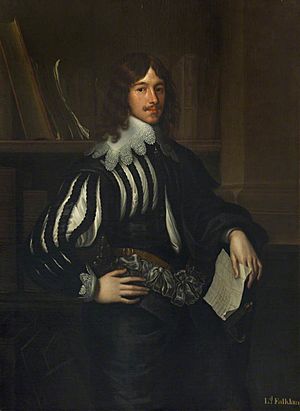Lucius Cary, 2nd Viscount Falkland facts for kids
Quick facts for kids
The Viscount Falkland
|
|
|---|---|

Portrait by Anthony van Dyck
|
|
| Secretary of State | |
| In office 8 January 1642 – 20 September 1643 |
|
| Monarch | Charles I |
| Preceded by | Sir Edward Nicholas |
| Succeeded by | The Earl of Bristol |
| Lord Privy Seal | |
| In office 1643–1643 |
|
| Monarch | Charles I |
| Preceded by | The Earl of Manchester |
| Succeeded by | Sir Edward Nicholas |
| Personal details | |
| Born | c.1610 Burford, Oxfordshire, England |
| Died | 20 September 1643 (aged 32 or 33) Newbury, Berkshire, England |
| Spouse | Lettice Moryson |
| Alma mater | Trinity College, Dublin St John's College, Cambridge |
| Military service | |
| Allegiance | Royalist |
| Rank | Cavalrymen |
| Battles/wars | English Civil War |
Lucius Cary, 2nd Viscount Falkland (born around 1610 – died 20 September 1643) was an English writer and politician. He was a member of the House of Commons from 1640 to 1642. During the English Civil War, he fought for the King's side, known as the Royalists. He sadly died in battle at the First Battle of Newbury.
Contents
Early Life and Family
Lucius Cary was born in Burford, England, either in 1609 or 1610. His father was Sir Henry Cary, who later became the first Viscount Falkland. His mother was Elizabeth. Lucius's father was an important official, serving as the King's representative in Ireland from 1622 to 1629. He was given the title of Viscount Falkland in 1620.
Lucius went to St John's College, Cambridge in 1621 and then to Trinity College, Dublin, where he earned his degree in 1625. When he was about 21, he married Lettice Moryson. In 1633, when his father passed away, Lucius became the 2nd Viscount Falkland. He was very interested in learning and believed in using reason to understand religious ideas, rather than just following old traditions.
The Great Tew Circle
Lucius Cary loved to study and learn. At his home in Great Tew, he created a special place for thinkers and writers. This group became known as the "Great Tew Circle." Many smart people, including famous writers like Ben Jonson and Abraham Cowley, came to his house. They enjoyed discussing ideas and sharing their knowledge. Edward Hyde, 1st Earl of Clarendon, a historian, described Falkland as "incomparable" and praised his welcoming home.
Political and Military Career
Lucius Cary's peaceful life of study was soon interrupted by war. He felt it was his duty to support King Charles I. He joined the King's army as a volunteer in 1639 during the Bishops' Wars against the Scots.
In 1640, he was elected to Parliament, representing Newport. He was re-elected later that year. In Parliament, he often spoke out against things he thought were unfair, like the "ship money" tax. He tried to make sure that justice was served, even when dealing with powerful people.
Falkland believed in making changes to the church, but he didn't want to get rid of bishops entirely. He feared that replacing them with a different system, like the Presbyterian one, could also become unfair. He famously said that "where it is not necessary to change, it is necessary not to change." This meant he thought people should only make big changes if they were absolutely needed.
However, the country was heading towards a major conflict. On January 1, 1642, the King asked Falkland to become a Secretary of State. Falkland accepted, which meant he became directly involved in the King's plans.
Falkland fought for the King in important battles of the English Civil War, including the Battle of Edgehill and the Siege of Gloucester. By this time, he felt very sad about the war. He was a man who valued peace and reason, and he saw how much suffering the war was causing. He didn't fully agree with either side's extreme views.
Lord Clarendon, a friend and historian, wrote that Falkland would often sigh and say "Peace, Peace," because the pain of the war was breaking his heart.
On the morning of the First Battle of Newbury, on September 20, 1643, Falkland told his friends he was "weary of the times" and believed he would not survive the day. He rode into battle and was killed. He was only 33 years old. His body was taken back to Great Tew and buried in the village churchyard.
Death and Legacy
Lucius Cary's eldest son, Lucius, became the 3rd Viscount Falkland after his father's death.
Today, a statue of Falkland stands in St Stephen's Hall in the Houses of Parliament in London. In 1909, a woman named Margery Humes, who was a suffragette (someone fighting for women's right to vote), chained herself to the statue as a protest. When authorities tried to remove her, they chipped off part of the statue's boot. This small damage was never repaired and is now seen as a symbol of the suffragettes' struggle for equal rights.
Writings and Ideas
Falkland wrote a book called Discourse of Infallibility, which was published after he died. In this book, he argued that people who use their reason to understand religious texts will either find the truth or be forgiven if they make a mistake. He also wrote some poems.
He is remembered not just for his writings or political actions, but for his way of thinking. He was a leader of rationalism, meaning he believed in using reason and logic, in a time when many people were very strict and intolerant in their beliefs.
Images for kids
 | Stephanie Wilson |
 | Charles Bolden |
 | Ronald McNair |
 | Frederick D. Gregory |






